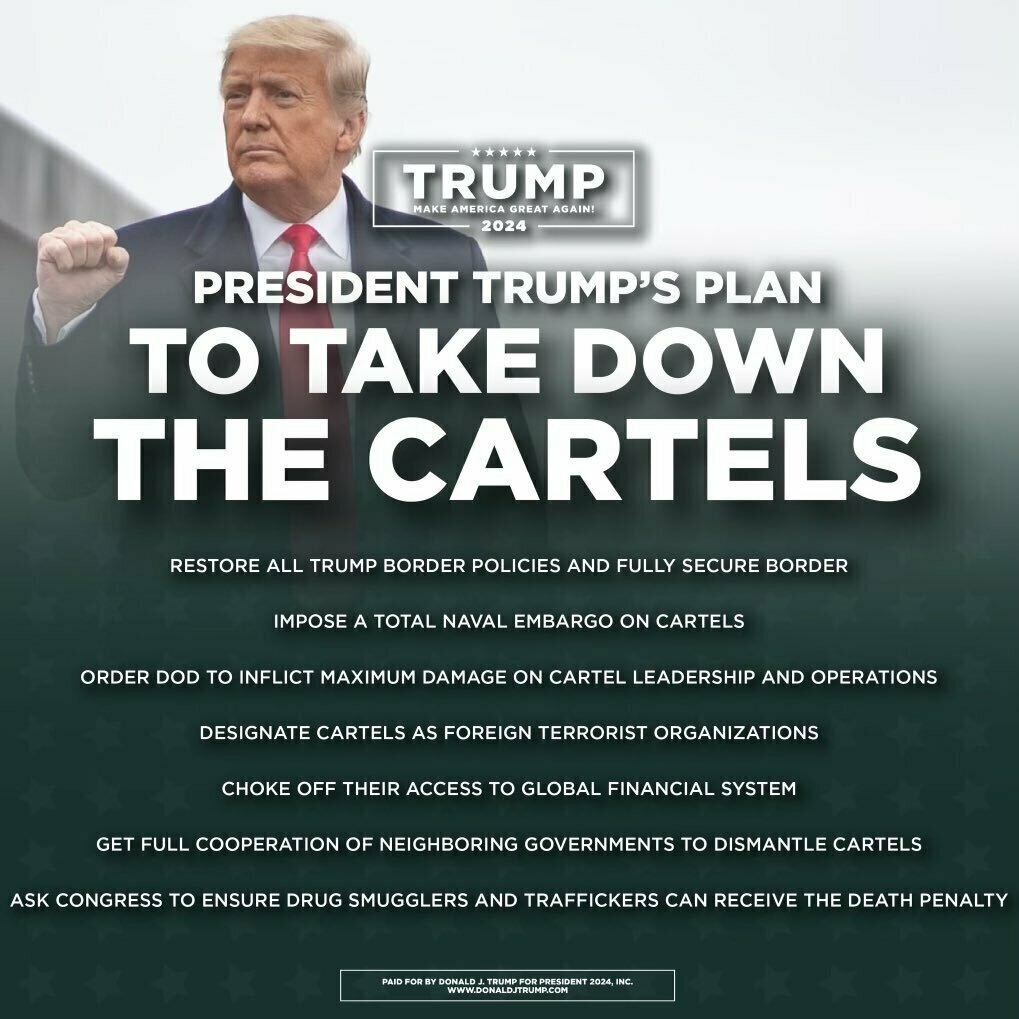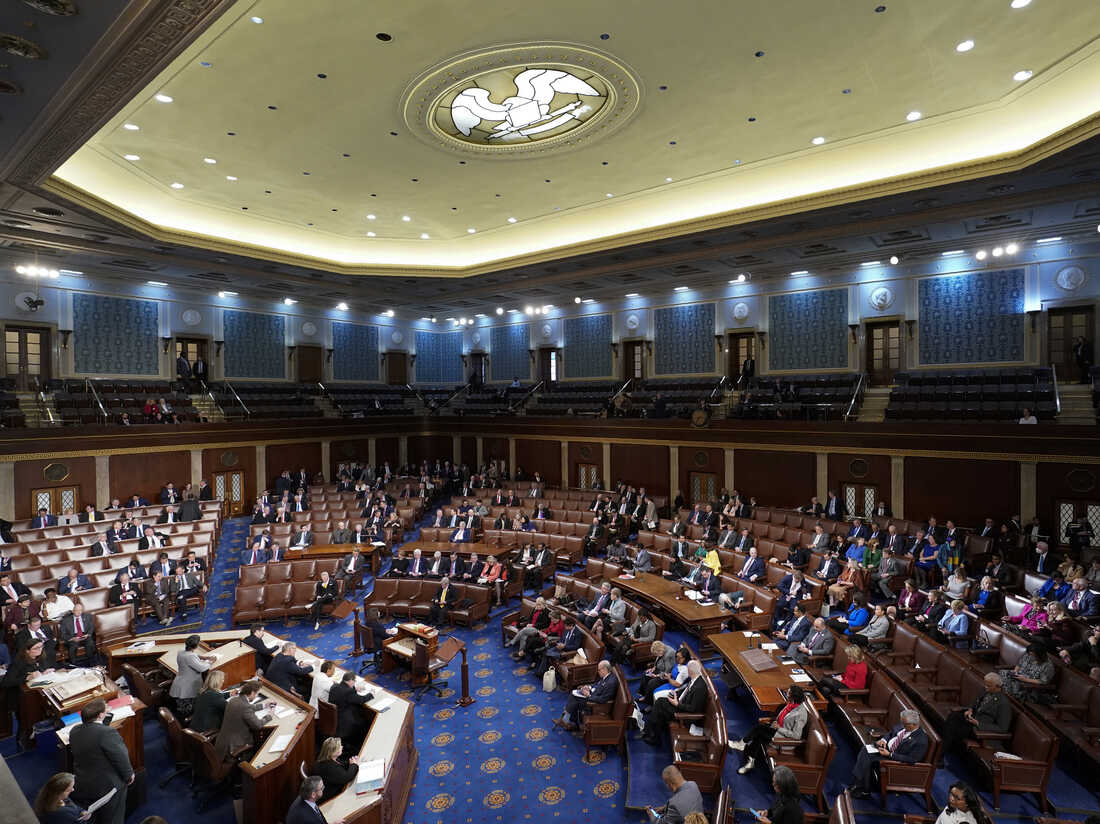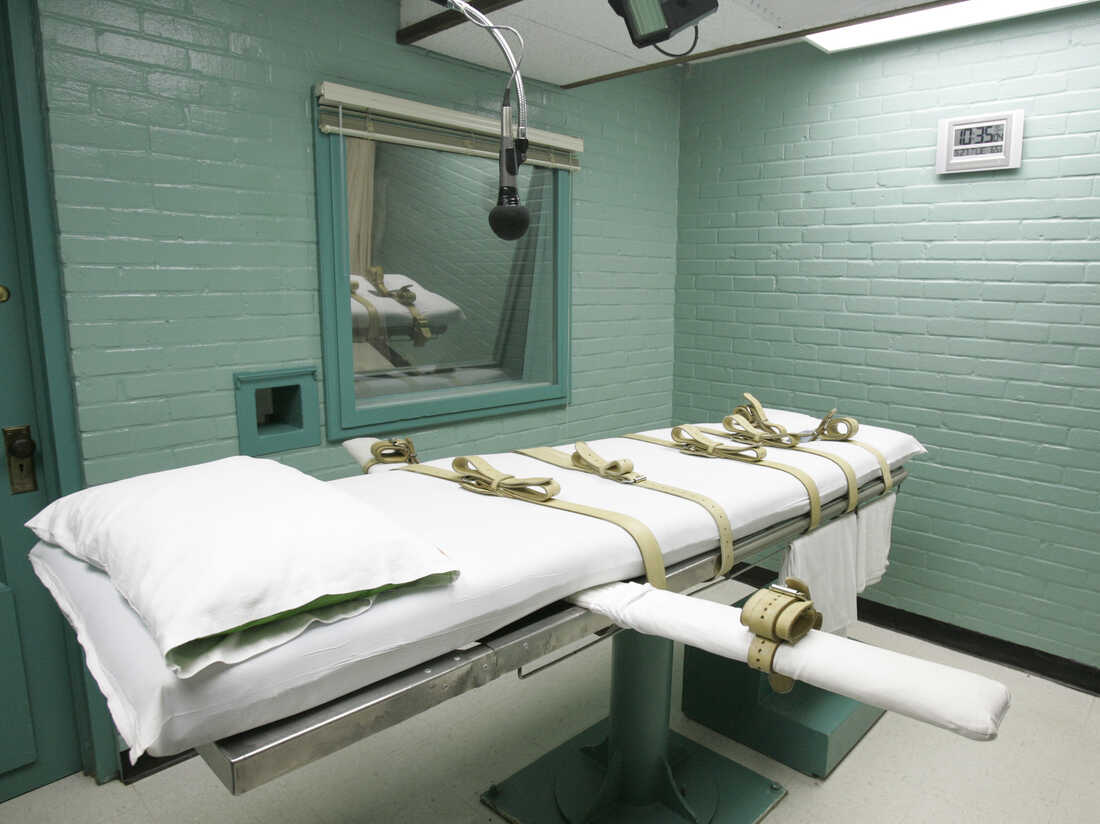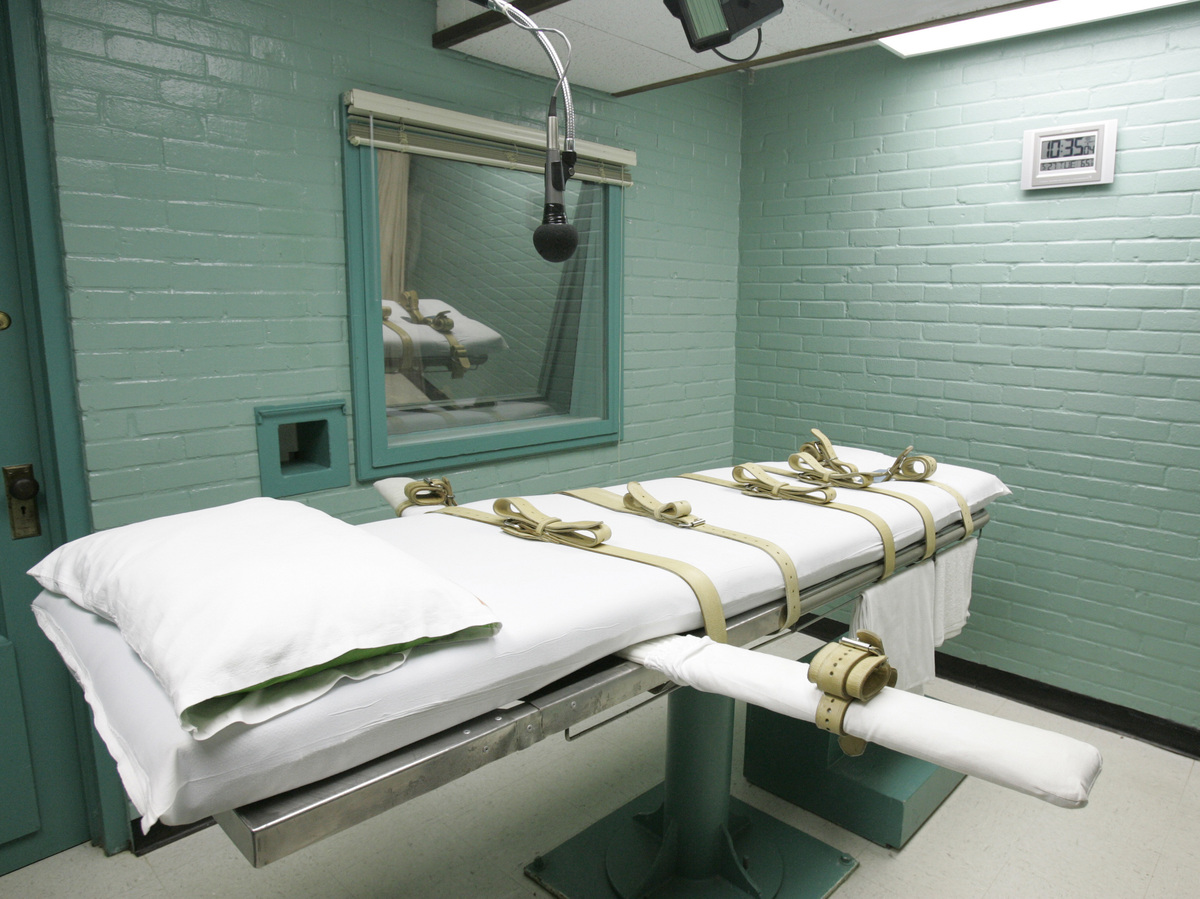
[ad_1]

Former President Trump on the annual New Hampshire Republican State Committee assembly in January. Trump has promised to crack down on the Mexican cartels by instituting the dying penalty for drug sellers and smugglers.
Reba Saldanha/AP
conceal caption
toggle caption
Reba Saldanha/AP

Former President Trump on the annual New Hampshire Republican State Committee assembly in January. Trump has promised to crack down on the Mexican cartels by instituting the dying penalty for drug sellers and smugglers.
Reba Saldanha/AP
Former President Donald Trump spoke to New Hampshire voters throughout a CNN city corridor held at St. Anselm College in Manchester Wednesday night time. Audience members requested how he would sort out points like abortion, Second Amendment rights, immigration and extra. But no one introduced up the opioid disaster plaguing the Granite State.
Two of New Hampshire’s main cities, Manchester and Nashua, noticed a spike in opioid-related deaths on the finish of 2022, WMUR reported in January, a 41% and 37% improve respectively. Like different states which have traditionally struggled with the well being disaster attributed to drug makers and distributors, New Hampshire is slated to obtain tens of hundreds of thousands of {dollars} in settlement payouts–an estimated $310 million–in the subsequent 20 years.
However, Trump does have a plan for addressing America’s drug issues, even when he did not focus on it Wednesday night time: institute the dying penalty for drug traffickers, smugglers and sellers. It’s an strategy in stark distinction with a lot of the world — it is also a violation of worldwide human rights legal guidelines.
This excessive place on drug offenses got here proper out of the gate with Trump’s candidacy. During his marketing campaign announcement final November, the previous president drummed a well-known beat on securing America’s southern border and combating Mexican drug cartels. He did not go into element on his guarantees, however did define how he would deal with sure drug offenses.
“We’re going to be asking everyone who sells drugs, gets caught selling drugs, to receive the death penalty for their heinous acts,” Trump said. “Because it’s the only way.”
But November wasn’t the primary time Trump instructed harsh penalties for drug offenders. It was one other occasion in Manchester when he delivered the same message as president. Speaking to a crowd at Manchester Community College on March 19, 2018, Trump espoused a powerful response to drug crimes:
“… if we don’t get tough on drug dealers, we’re wasting our time, just remember that, we’re wasting our time, and that toughness includes the death penalty,” Trump lambasted.
Using the opioid epidemic as a backdrop on the time, Trump in contrast penalties for drug sellers and murderers. He claimed some drug sellers will kill hundreds of individuals of their lifetime and that, if caught, they face mild sentences: 30 days in jail, “they’ll go away for a year,” he advised his supporters, “or they’ll be fined.”
“And yet if you kill one person, you get the death penalty or you go to jail for life.”
Details about Trump’s coverage aren’t clear

Details about Trump’s proposed agenda are restricted, however the former president outlined a few of his plans in a advert on his marketing campaign’s official Twitter account.
Donald J. Trump for President 2024, Inc.
conceal caption
toggle caption
Donald J. Trump for President 2024, Inc.

Details about Trump’s proposed agenda are restricted, however the former president outlined a few of his plans in a advert on his marketing campaign’s official Twitter account.
Donald J. Trump for President 2024, Inc.
The former president has a historical past of constructing brazen coverage guarantees that he didn’t ship: having Mexico pay for a wall alongside the southern border, implementing a nation-wide hid carry weapon allow and ending birthright citizenship to call a couple of.
NPR reached out to the Trump crew with questions concerning the specifics of how he would fight Mexico’s cartels particularly and drug crimes extra broadly. The inquiry went unanswered. Still, there may be publicly out there info to find out the strategy Trump intends to take, most notably in a 2024 campaign agenda.
He guarantees to “impose a total naval embargo on cartels” and demand the Department of Defense “inflict maximum damage on cartel leadership and operations”. Trump mentioned he’ll have cartels designated as overseas terrorist organizations and can “choke off their access to the global financial system”.
Furthermore, he pledged to work with neighboring governments to dismantle the cartels, backed by the specter of exposing “every bribe and kickback that allows these criminal networks to preserve their brutal reign”.
The agenda concludes with Trump asking Congress to cross laws to make sure drug smugglers and traffickers are eligible for the dying penalty.
“When President Trump is back in the White House, the drug kingpins and vicious traffickers will never sleep soundly again,” the pledge reads.
Is Trump’s strategy affordable? Possible?

The House of Representatives chamber within the U.S. Capitol Building in Washington, D.C., Jan. 5, 2023. Trump must persuade Congress in addition to particular person state legislatures to implement a nation-wide dying penalty.
Alex Brandon/AP
conceal caption
toggle caption
Alex Brandon/AP

The House of Representatives chamber within the U.S. Capitol Building in Washington, D.C., Jan. 5, 2023. Trump must persuade Congress in addition to particular person state legislatures to implement a nation-wide dying penalty.
Alex Brandon/AP
According to University of Notre Dame Law Professor Jimmy Gurulé, who additionally serves because the director of the college’s Exoneration Justice Clinic, Trump’s pledge to enact capital punishment for drug offenses is not life like.
In order for Trump’s agenda to be applied nationwide, he must persuade nearly all of lawmakers in Congress in addition to these in state legislatures.
America’s drug legal guidelines fall below Title 21 of the U.S. Code, the place subsections 841 and 960, in essence, prohibit the manufacturing and distribution of managed substances.
But drug fees will be tough.
Gurulé defined that drug-related offenses violate federal and state legal guidelines. However, “the vast majority of drug trafficking offenses are prosecuted at the state level as a state criminal offense,” he defined.
As a end result, federal offenses make up solely a “small fraction” of all drug smuggling prosecutions. Which is why if Trump in some way satisfied a divided Congress to cross a dying penalty bill–a lengthy shot on its own–it would solely apply on the federal stage, thus not having a lot of an impression on sentencing for particular person states.
“I think it may be intended to generate press headlines, but in terms of it being a serious recommendation, a serious proposal to a serious problem … it’s not a serious recommendation,” Gurulé mentioned.
In brief, the previous president’s strategy to tackling America’s drug downside via the dying penalty is bombastic; a promise he can’t hold.
States using the dying penalty are on the decline

The state of Texas execution chamber in Huntsville, Texas, pictured on May 27, 2008. The variety of states that make the most of the dying penalty are on the decline. It’s at present authorized in 27 states, however 4 states have abolished the observe within the final 5 years, and lots of others have not carried out an execution in over a decade.
Pat Sullivan/AP
conceal caption
toggle caption
Pat Sullivan/AP

The state of Texas execution chamber in Huntsville, Texas, pictured on May 27, 2008. The variety of states that make the most of the dying penalty are on the decline. It’s at present authorized in 27 states, however 4 states have abolished the observe within the final 5 years, and lots of others have not carried out an execution in over a decade.
Pat Sullivan/AP
As president, Trump reinstated executions of federal inmates sentenced to the dying penalty in 2019. Before leaving the Oval Office in 2021, Trump oversaw 13 executions, greater than every other president in at the least 100 years, in keeping with Federal Bureau of Prisons records.
There hasn’t been a federal execution since President Biden took workplace.
However, executions on the state stage haven’t stopped and Biden’s 2020 marketing campaign promise to abolish the federal dying penalty stays unfulfilled.
Capital punishment is at present authorized in 27 states, but it surely’s falling out of favor with lawmakers. Four states (Colorado, New Hampshire, Washington and Virginia) have dropped the death penalty previously 5 years.
Meanwhile, governors in California, Oregon and Pennsylvania have moratoriums prohibiting executions, in keeping with the Death Penalty Information Center, and California Gov. Gavin Newsom, a Democrat, pledged to abolish the state’s death penalty–America’s largest dying row –by 2024.
Some states that retain the dying penalty have not carried a sentence out in at the least a decade, Gurulé mentioned. Additionally, the District of Columbia and the navy haven’t had an execution in that very same time span.
“And so again, no matter how you look at it, the movement, the trend is clearly away from imposition of the death penalty,” he defined.
But it is necessary to notice that simply because the general public favor of the dying penalty is on the decline, it’s nowhere close to a one-sided problem. In reality, a Gallup poll performed final October means that 55% of Americans are in favor of capital punishment for convicted murderers, which is what the dying penalty has traditionally been reserved for, Gurulé mentioned. Those numbers prolong a downward development from 80% in 1976 however nonetheless characterize greater than half of the inhabitants.
Gallup has persistently discovered that Republicans are overwhelmingly in favor of the dying penalty, whereas Democrats are more and more much less supportive 12 months after 12 months.
The downward development is probably going due in some half to America’s ongoing racial reckoning.
For occasion, California handed a 2022 invoice targeting racial bias evident in dying row convictions, an acknowledgment of the United States’ historical past exhibiting harsher conviction penalties for individuals of coloration. This is particularly evident in drug offenses, because the Department of Justice reported almost 80% of federal prisoners for drug fees had been Black, Hispanic, or Latino between 1998 and 2012.
Capital punishment for drug fees goes in opposition to worldwide human rights legal guidelines

Protestors outdoors the Supreme Court constructing in Washington, D.C., June 29, 2022, push for abolishment of the dying penalty. In the eyes of the United Nations, capital punishment needs to be reserved for less than essentially the most severe of crimes reminiscent of homicide in nations the place the observe has but to be abolished.
Jacquelyn Martin/AP
conceal caption
toggle caption
Jacquelyn Martin/AP

Protestors outdoors the Supreme Court constructing in Washington, D.C., June 29, 2022, push for abolishment of the dying penalty. In the eyes of the United Nations, capital punishment needs to be reserved for less than essentially the most severe of crimes reminiscent of homicide in nations the place the observe has but to be abolished.
Jacquelyn Martin/AP
The U.S. has 44 federal inmates on dying row and greater than 2,000 on the state stage. It’s in a small group of nations that perform executions as a type of punishment, a lot of which the U.S. has usually been essential of, Gurulé mentioned.
An growth of the dying penalty for drug offenses within the U.S. could be a violation of the United Nations’ International Covenant on Civil and Political Rights (ICCPR), a multilateral peace treaty designed to acknowledge and shield the essential human rights, which greater than 170 nations abide by. The covenant says the dying penalty needs to be carried out just for “the most serious crimes” in nations which have but to abolish that type of punishment altogether.
“Unfortunately, [the] United States finds itself in that minority of countries, of that group of 55 countries that continue to retain the death penalty,” Gurulé mentioned. “… And again, sadly, that group of countries … they’re some of the most significant human rights violators in the world, such as Syria, China, North Korea, and here, the United States.”
According to the ACLU, the United States has to adjust to the treaty as a result of after it was ratified in 1992, the covenant obtained federal legislation standing below the U.S. Constitution’s Supremacy Clause.
“The ICCPR applies to all government entities and agents, including all state and local governments in the United States,” the ACLU states.
Violations of the treaty are introduced earlier than the UN’s Human Rights Committee, which is made up of impartial specialists that monitor and implement the covenant. Countries that fall below the treaty even have to face earlier than the committee in Switzerland for assessment each four-and-a-half years. In the U.S., the State Department submits a report back to the committee for assessment, which then points its considerations and proposals.
The U.S. was final reviewed March 17, 2021, the place the committee issued 347 suggestions, 280 of which had been wholly or partially adopted. In an announcement to the committee, the federal government acknowledged and addressed a number of violations, together with the usage of capital punishment.
“We received recommendations from 33 countries concerning the administration of capital punishment at the State and Federal level,” the State Department’s assertion reads. “While we respect those who make these recommendations, they reflect continuing differences of policy, not differences about what the United States’ international human rights obligations require.”
With Trump’s proposal to increase the usage of the dying penalty, he’s reigniting a debate over the observe that continues to be unsettled.
Still, in keeping with Gurule, even discussing capital punishment as a coverage proposal threatens the standing of the U.S. on the planet when most nations condemn the dying penalty.
“It really undermines the U.S.’s position when it’s attempting to take the high moral ground and claim ‘oh, you know, these other countries are human rights violators.’,” he mentioned. “Then the United States leaves itself open for criticism.”
[adinserter block=”4″]
[ad_2]
Source link
